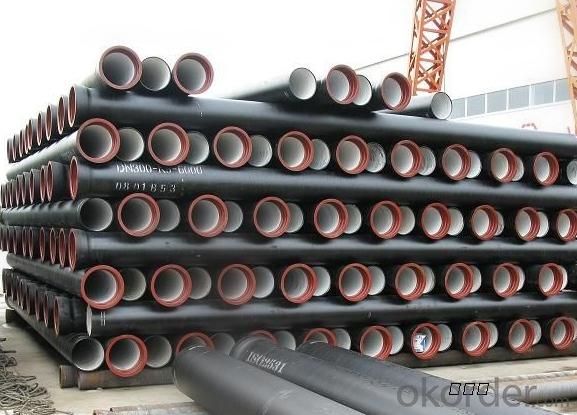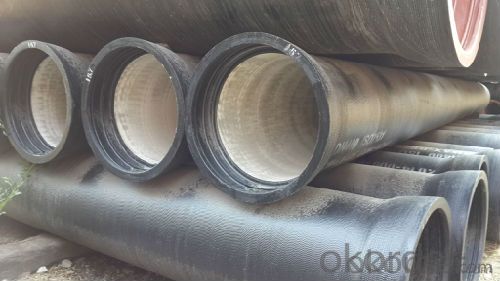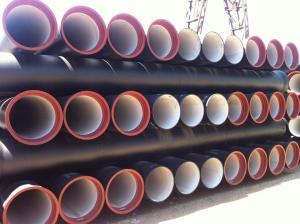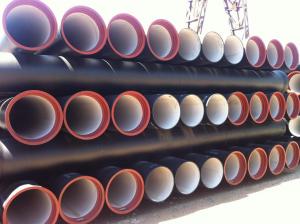Ductile Iron Pipe DN500-DN1000 EN545/ISO2531 of China
- Loading Port:
- China main port
- Payment Terms:
- TT or LC
- Min Order Qty:
- 1000 m
- Supply Capability:
- 500000 m/month
OKorder Service Pledge
OKorder Financial Service
You Might Also Like
1. Ductile Iron Pipe Description :
It has high strength & hardnes as steel and better corrosin resistance than steerl and grey iron, I ductile iron pipe is the ideal substute for gray cast iron pipe and common steel pipe. In addition, our DI pipes are produced with good straightness, identical wall thickness, high dimension accuracy, smooth surface finished, remarkable mechanical properties and firmly sticking internal & external coating layer as well. We are renowned for our product quality and after sales service. We export ductile iron pipe to global customers, features by its high strength and corrosion resistance, our product accept inspection
2. Ductile Iron Pipe Main Features:
- For potable water supply
- High strength
- Long lifespan
- Good corrosion resistance
- Easy installation
1. ISO 2531 or EN 545 Standard K9 Class, K7 Class and C Class
2. ISO 9001 Certificate
3. ISO 2531 & EN 545 Certificate
4. WRAS Potable Water Certificate for Cemen Internal Lining
5. WRAS EPDM Rubber Gasket or NBR Rubber Gasket
6. DN80mm - DN2600mm
3.Ductile Iron Pipe Images:


4.Ductile Iron Pipe Specification:
1. ISO 2531 & EN 545 Standard
2. K8, K9, K10 C Class
3. Internal Linings: Portland Cement
4. External Coating: Bitumen/ Epoxy
5. Joint Type: T Joint, K Joint, N1 Joint, MJ Joint and Flange Joint.
6. Shipment: By bulk ship or 20'/40' container
7. Rubber: NBR, SBR, EPDM according to ISO4633/EN681.1
8.Quick Delivery
5.FAQ:
Here some questions always been asked
· Industry experience over 20 years.
· Management Systems-Internal Software
· Finished Product Inventory-More Than 5000 Tons.
· Raw Material inventory -Over 8000 Mertic Tons.
· The most convenient transport and prompt delivery.
· Competitive price with best service .
· High technical production line with top quality products.
· High reputation based on best quality products.
- Q:How does ductile iron pipe compare to PVC pipe in terms of strength?
- Generally, ductile iron pipe is considered stronger than PVC pipe due to its composition of iron and carbon, which provides it with high tensile strength and resistance to breakage. It is commonly utilized in heavy-duty applications like water mains, sewer lines, and industrial piping due to its ability to withstand high pressures. On the flip side, PVC pipe is manufactured using a plastic material known as polyvinyl chloride. While PVC pipe is lightweight and easy to handle, it lacks the strength of ductile iron pipe. It is typically used in low-pressure applications such as household plumbing, irrigation systems, and drainage pipes. When comparing the strength of ductile iron pipe to PVC pipe, the former has a greater capacity to handle heavy loads, endure ground movement, and resist damage from external factors like rocks or tree roots. Additionally, ductile iron pipe is more durable and has a longer lifespan in comparison to PVC pipe. However, it is important to consider that the choice between ductile iron pipe and PVC pipe ultimately depends on the specific requirements of the project. Factors such as cost, environmental conditions, ease of installation, and desired longevity should all be taken into account when determining the appropriate type of pipe to utilize.
- Q:How do ductile iron pipes handle ground settlement due to construction activities?
- Ductile iron pipes have the ability to handle ground settlement caused by construction activities due to their flexibility and strength. These pipes are designed to withstand external pressure and can accommodate minor ground movements without significant damage or failure. The ductility of the material allows the pipes to deform slightly, absorbing the ground settlement and preventing them from cracking or breaking. Additionally, the joints in ductile iron pipes are typically flexible, allowing for further movement and reducing the risk of leakage or structural issues. Overall, ductile iron pipes are well-suited for withstanding ground settlement and ensuring the integrity of the pipeline system during construction activities.
- Q:Can ductile iron pipe be used for underground storage tank systems?
- Yes, ductile iron pipe can be used for underground storage tank systems. Ductile iron pipe is known for its durability and strength, making it suitable for various applications, including underground storage tanks. Its high tensile strength and resistance to corrosion make it an ideal choice for containing and transporting liquids or gases in underground environments. Additionally, ductile iron pipe is highly resistant to external pressures and can withstand heavy loads, making it a reliable option for underground storage tank systems.
- Q:Are ductile iron pipes resistant to impact damage?
- Ductile iron pipes possess remarkable strength and durability, rendering them resistant to impact damage. Their exceptional toughness and flexibility are a result of their unique composition, which includes a higher percentage of carbon and silicon. Consequently, ductile iron pipes can withstand external forces and impacts, such as those caused by heavy construction equipment or accidental incidents during installation or maintenance activities. Moreover, these pipes exhibit a high resistance to cracking and fracturing, thereby further enhancing their ability to endure impact damage. However, it should be noted that although ductile iron pipes are highly resistant to impact damage, they are not completely immune. Extreme or repeated impacts may still inflict damage, albeit to a lesser extent compared to other pipe types. Regular inspections and maintenance are crucial to detecting and addressing any potential impact damage to ensure the long-term integrity and performance of ductile iron pipes.
- Q:Are ductile iron pipes suitable for use in geothermal applications?
- Yes, ductile iron pipes are suitable for use in geothermal applications. Geothermal systems involve harnessing the Earth's heat to generate energy or provide heating and cooling for buildings. Ductile iron pipes are known for their strength, durability, and corrosion resistance, all of which are vital qualities for geothermal applications. Geothermal systems often operate at high temperatures and pressures, and ductile iron pipes can withstand these conditions without compromising their structural integrity. They can handle the thermal expansion and contraction that occur in geothermal systems, ensuring a reliable and long-lasting piping solution. Furthermore, ductile iron pipes have excellent resistance to corrosion, making them well-suited for the potentially corrosive environment found in geothermal applications. This resistance ensures that the pipes will not degrade over time, maintaining the integrity of the system and minimizing the risk of leaks or failures. Additionally, ductile iron pipes have a smooth interior surface, which helps to minimize pressure loss and reduce energy consumption in geothermal systems. Their smoothness also reduces the likelihood of mineral deposits or scaling buildup, ensuring efficient and uninterrupted heat transfer. Overall, ductile iron pipes are a suitable choice for geothermal applications due to their strength, durability, corrosion resistance, thermal stability, and smooth interior surface. They provide a reliable and efficient piping solution that can withstand the demanding conditions of geothermal systems while ensuring long-term performance and minimal maintenance requirements.
- Q:How are ductile iron pipes protected against root intrusion?
- Ductile iron pipes are protected against root intrusion through various methods and techniques. One commonly used approach is the application of root inhibitors or growth regulators. These chemicals are typically injected into the soil around the pipes, creating a barrier that inhibits root growth near the pipe. This helps prevent roots from penetrating the pipe and causing damage. Another method involves the use of physical barriers such as root barriers or sleeves. These are installed around the pipes to physically block the roots from accessing them. Root barriers are typically made of materials like plastic or metal and are designed to withstand the pressure exerted by growing roots. Additionally, regular maintenance practices such as periodic inspections and cleaning are essential in preventing root intrusion. By monitoring the condition of the pipes and removing any existing root masses, the risk of further root intrusion can be minimized. It is worth noting that preventative measures are more effective than reactive measures when it comes to protecting ductile iron pipes against root intrusion. Therefore, implementing proactive strategies during the installation phase, such as proper pipe bedding and alignment, can help reduce the likelihood of root intrusion in the first place. Overall, a combination of chemical treatments, physical barriers, and appropriate maintenance practices can significantly enhance the protection of ductile iron pipes against root intrusion, ensuring their long-term durability and functionality.
- Q:What if the ductile iron pipe is broken?
- Ductile cast iron pipes are broken because of the excessive heat treatment during casting or the lack of proper addition in casting to prevent the proper change of the proper brittleness and cause the rupture to be effective.
- Q:Are ductile iron pipes suitable for installation in areas with high soil settlement and consolidation?
- Ductile iron pipes are commonly used in areas where there is significant soil settlement and consolidation. One of the main advantages of these pipes is their ability to withstand external loads and accommodate ground movement. Compared to other pipe materials, ductile iron pipes are known for their strength and flexibility, making them more resistant to soil settlement and consolidation. They have a higher tensile strength and can withstand heavy loads and ground vibrations without cracking or breaking. This makes them suitable for areas with soil prone to settlement and consolidation. Moreover, ductile iron pipes have a high resistance to corrosion and can withstand aggressive soil conditions, which are often found in areas prone to settlement and consolidation. They are also less likely to be damaged by external factors such as roots or rocks, making them even more suitable for installation in such areas. However, it is important to consider the specific conditions of the site and consult with engineers or experts who are familiar with the local soil conditions. Factors such as the magnitude and rate of settlement, soil type, groundwater levels, and construction methods should be taken into account when determining whether ductile iron pipes are appropriate for installation in areas with high soil settlement and consolidation. In conclusion, ductile iron pipes are generally a suitable choice for installation in areas with high soil settlement and consolidation. Their strength, flexibility, resistance to corrosion, and ability to withstand external loads make them a reliable option for these conditions. Nevertheless, it is always recommended to assess the specific site conditions and consult with professionals to ensure the most appropriate pipe material is selected for each project.
- Q:What are the typical pressure surge protection measures for ductile iron pipe?
- There are several typical pressure surge protection measures for ductile iron pipe that help ensure its integrity and longevity. These measures include: 1. Surge tanks: Surge tanks are commonly used to absorb pressure surges and minimize their impact on the ductile iron pipe. These tanks are typically installed at critical points in the pipeline system, such as at pump stations or near valves, to provide a reservoir for excess pressure. 2. Air release valves: Air release valves are essential components in ductile iron pipe systems that help release trapped air and prevent the formation of air pockets. These valves help maintain a stable pressure within the pipe and reduce the risk of pressure surges during operation or sudden changes in flow. 3. Pressure relief valves: Pressure relief valves are designed to protect ductile iron pipes by releasing excess pressure when it exceeds a predetermined threshold. These valves are typically installed at strategic locations in the pipeline system and are set to open when the pressure exceeds a safe limit, diverting the excess pressure to prevent damage to the pipe. 4. Surge suppressors: Surge suppressors are devices that are installed in ductile iron pipe systems to absorb and dissipate pressure surges. These devices act as shock absorbers, reducing the impact of pressure fluctuations and preventing damage to the pipe. Surge suppressors are particularly effective in situations where pressure surges are frequent or severe. 5. Pipe wall thickness: Another crucial measure for pressure surge protection in ductile iron pipe is ensuring an appropriate pipe wall thickness. By selecting a pipe with the correct wall thickness, engineers can ensure that the pipe can withstand the pressure surges it may encounter during operation. This helps prevent pipe failure or rupture due to excessive pressure. It is important to note that the specific pressure surge protection measures implemented for ductile iron pipe may vary depending on the specific application, pipe size, operating conditions, and regulatory requirements. Consulting with experts in pipeline engineering and design is crucial to determine the most suitable pressure surge protection measures for a particular ductile iron pipe system.
- Q:What is the maximum operating pressure for ductile iron pipes?
- The maximum operating pressure of ductile iron pipes may vary based on factors like pipe diameter, wall thickness, and the specific usage. Nonetheless, typically, ductile iron pipes are engineered to endure pressures of up to 350 psi (pounds per square inch), and occasionally even higher. It is worth highlighting that to ascertain the precise maximum operating pressure for a specific ductile iron pipe system, one should refer to local regulations, engineering standards, and manufacturer specifications.
1. Manufacturer Overview |
|
|---|---|
| Location | |
| Year Established | |
| Annual Output Value | |
| Main Markets | |
| Company Certifications | |
2. Manufacturer Certificates |
|
|---|---|
| a) Certification Name | |
| Range | |
| Reference | |
| Validity Period | |
3. Manufacturer Capability |
|
|---|---|
| a)Trade Capacity | |
| Nearest Port | |
| Export Percentage | |
| No.of Employees in Trade Department | |
| Language Spoken: | |
| b)Factory Information | |
| Factory Size: | |
| No. of Production Lines | |
| Contract Manufacturing | |
| Product Price Range | |
Send your message to us
Ductile Iron Pipe DN500-DN1000 EN545/ISO2531 of China
- Loading Port:
- China main port
- Payment Terms:
- TT or LC
- Min Order Qty:
- 1000 m
- Supply Capability:
- 500000 m/month
OKorder Service Pledge
OKorder Financial Service
Similar products
New products
Hot products
Related keywords




























